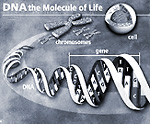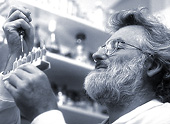The landmark decoding of the human genome, recently made accessible
to all on the Internet, is a historic step for science, though
one that raises ethical questions.
Implications of this development were addressed in a Vatican Radio
interview with Bishop Elio Sgreccia, vice president of the Pontifical Academy for Life, founded by
John Paul II. The interview is distributed by Zenit, an international
news service with ties to the Vatican.
Vatican Radio: First of all, is the church for or against biomedical research?
Bishop Elio Sgreccia: The Catholic Church, on repeated occasions, has expressed its
appreciation and encouragement for scientific research, especially
when directed to the prevention and treatment of sicknesses and
the alleviation of human suffering. This type of research is regarded
as consistent with faith in God the Creator.
Many church texts could be quoted… for example, the Vatican Council
II passage that states: “If methodical investigation within every
branch of learning is carried out in a genuinely scientific manner
and in accord with moral norms, it never truly conflicts with
faith, for earthly matters and the concerns of faith derive from
the same God. Indeed whoever labors to penetrate the secrets of
reality with a humble and steady mind, even though he is unaware
of the fact, is nevertheless being led by the hand of God, who
holds all things in existence, and gives them their identity”
[“Gaudium et Spes,” No. 36].
Regarding biomedical research, the Council also affirmed, “Advances
in biology, psychology, and the social sciences not only bring
men hope of improved self-knowledge; in conjunction with technical
methods, they are helping men exert direct influence on the life
of social groups” [Gaudium et Spes, No. 5]. In a recent address
to the participants of an international Congress on Transplants,
John Paul II expressed his clear support of biomedical research.
VR: Does the church collaborate with present biomedical research?
BES: History already confirms this collaboration—discoveries in the
genetic field were carried out by monk Gregor Johann Mendel [1822-1884].
This support is of eloquent timeliness today in research institutions,
departments of medicine, and hospitals directed by the church.
Scientific research is pursued (in such institutions) with determination
and results, despite the fact that sometimes they lack resources.
They are especially known for their prevention and treatment of
sicknesses.
VR: However, the church puts limits on research. What are these?
BES: There is no doubt that experimental science, just like all human
activity, must be directed to human good and the respect of each
person, both in the objectives it pursues, as well as in the methods
it employs. It must always respect every human individual involved
in experimentation, especially in the most vulnerable phases of
life, or when the individual subjected to experimentation cannot
give his consent.
This disfigured use of science has written dark pages in recent
history, and research of this kind should not happen again; not
only would it be an attack against God, but also against civilization.
VR: The church has entered the debate arising from the ethical questions
posed by experimentation with stem cells. What is the position
of the Pontifical Academy for Life?
BES: It is worth recalling that in the Academy’s document regarding
the use of stem cells, encouragement is expressed for research
with stem cells taken from adults or, in a birth, from the umbilical
cord, as well as from fetuses aborted involuntarily.
The hope of attempting to remedy serious sicknesses through this
way has been repeated, encouraged and applied in the same research
institutions of Catholic inspiration. From an ethical point of
view, the Academy is opposed to the destructive use of embryos
for the purpose of doing research with stem cells, and on every
form of human. This is based on rational ethics and not solely
on religious faith.
We consider that the living human embryo is a human being who
(deserves) the respect owed to every human, without any discrimination
whatsoever. We are convinced that we are respecting science as
regards the identity and status of the human embryo. [For more
information, see “Identity and Status of the Human Embryo,” http://www.ixtmedia.com/].
Moreover, our position is in agreement with that of other institutions,
such as the European Parliament.
VR: Some have criticized the church’s position on the use of animal
and vegetable biotechnologies.
BES: As regards the use of animal and vegetable biotechnologies,
we have simply made evident the need to be aware of the risks
to health, especially in the case of the cultivation of seeds
and vegetables that are included in the preparation of foods derived
from transgenic organisms.
Likewise, we have confirmed the obligation to inform citizens
and safeguard justice in the economic realm, especially as regards
developing countries.
[The church’s] commitment to ethical and scientific reflection
attempts to offer an honest and loyal intellectual contribution
to researchers, and information to peoples and the public in the
world, who should respect the effort being made and the values
proposed.
Top








